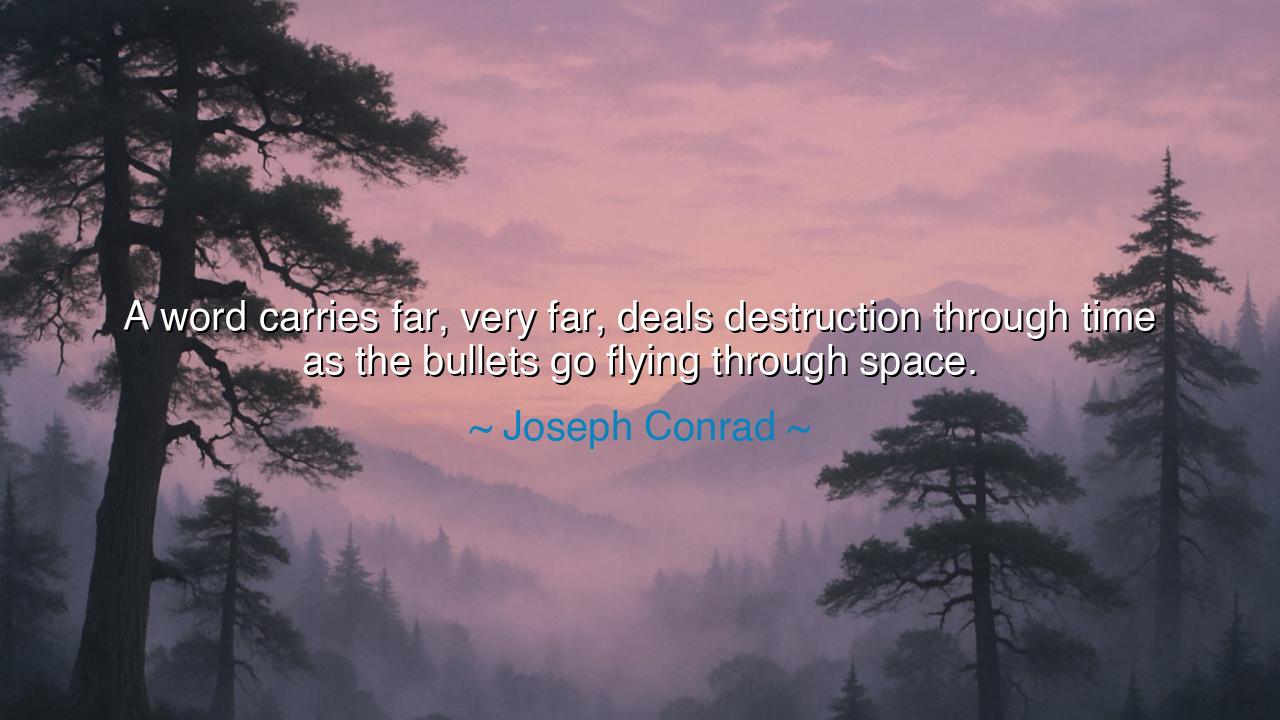
A word carries far, very far, deals destruction through time as
A word carries far, very far, deals destruction through time as the bullets go flying through space.






Host: The quiet of the evening wrapped around the room, creating a space for deep reflection. Jack sat at the table, his fingers lightly resting on his cup, contemplating the weight of Joseph Conrad's words. Jeeny stood near the window, her gaze turned outward as she considered the powerful truth behind Conrad's statement.
Jeeny: “I’ve been thinking about what Joseph Conrad said: ‘A word carries far, very far, deals destruction through time as the bullets go flying through space.’ It’s such a striking image, isn’t it? The idea that words—like bullets—can have a devastating impact that stretches far beyond the moment they’re spoken, and the effect lingers, echoing over time.”
Jack: “Yes, exactly. It’s a powerful reminder that the impact of words isn’t just about the immediacy of their delivery. It’s about how they can echo through time, how they can shape thoughts, emotions, and even events long after they’re spoken. Just like a bullet can hit its target in an instant, a word can cut deep and continue to affect someone, or an entire situation, for years to come.”
Jeeny: “Exactly. There’s a kind of irreversibility to words, just like with bullets. Once they’re out there, they’re out there—whether they’re meant to heal or to hurt. Conrad is showing us how destructive words can be, how easily they can escalate situations or affect people, sometimes without us fully understanding the consequences.”
Host: The stillness in the room deepened, as both Jack and Jeeny reflected on the profound weight of Conrad’s words. Jack’s fingers rested on the table, while Jeeny’s expression softened, contemplating how often words, once spoken, carry a force beyond our control.
Jack: “It makes me think about how careful we need to be with our words. When we speak, we might not fully realize the impact we have, or how far-reaching our words can be. They don’t just disappear—they travel, they linger, they shape perceptions. What we say today can affect tomorrow, the next year, or even generations down the line.”
Jeeny: “Yes, and that’s why words are so powerful. They can inspire, yes, but they can also destroy. Think about the way language has been used to divide, to manipulate, or to incite conflict throughout history. A single phrase, a single comment, can change the course of someone's life or even an entire nation. Conrad is reminding us that, just like a bullet, once a word is fired, there’s no taking it back.”
Jack: “It also makes me think about how often we underestimate the long-term effects of what we say. We can get so caught up in the moment, in the emotions of the situation, that we don’t consider the aftershocks. Just as bullets can do damage in an instant, words can create ripples of destruction that extend beyond what we can immediately see.”
Jeeny: “Exactly. It’s about the lasting impact. Conrad is showing us that words have a timeless quality to them. They don’t just vanish; they hang around, they linger, and they shape everything from relationships to history. They carry weight, and they can do both great good and immense harm.”
Host: The quiet in the room grew even more profound, the realization that words are not just fleeting expressions, but potent forces that have lasting consequences. Joseph Conrad’s words had illuminated the power of language—not just in the moment, but in the way it resonates through time. Jack leaned back slightly in his chair, while Jeeny’s gaze softened, reflecting on the profound responsibility that comes with the things we say.
Jack: “So, what Conrad is showing us is that we need to be aware of how our words can affect others, not just in the moment but over time. They can be constructive, or they can be destructive—responsibility comes in understanding that impact.”
Jeeny: “Exactly. Words are not just communication—they are weapons and tools that can build or break, heal or hurt. Conrad is reminding us that we should choose our words carefully because they have the power to shape the world long after they’ve left our lips.”
Host: The evening had fully settled in, their conversation lingering on the powerful truth of Joseph Conrad’s words. The understanding that words are not just temporary but carry a weight and impact over time was clear. The world outside had darkened, but inside, there was light—a recognition that the words we choose can shape not only the moment but the future.






AAdministratorAdministrator
Welcome, honored guests. Please leave a comment, we will respond soon